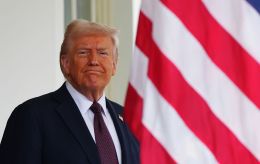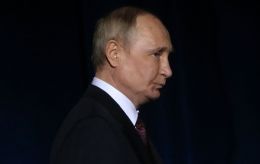Breakdown of London talks. Rubio's demarche and why the US is pressuring Ukraine again
 Photo: US Secretary of State Marco Rubio (Getty Images)
Photo: US Secretary of State Marco Rubio (Getty Images)
The United States has refused to participate in the summit of foreign ministers in London, where the final proposals for a peace agreement were to be discussed.
RBC-Ukraine explains the reason behind this unexpected move and how it will affect further negotiations.
Takeaways
- What is behind Rubio's refusal to participate in the London summit?
- What is Ukraine's position regarding the US proposals?
- Does the US have opportunities to reach a compromise with Europe on lifting sanctions against Russia and ending the war?
Today, April 23, a multilateral meeting at the level of foreign ministers was supposed to take place in London, dedicated to prospects for ending the Russia-Ukraine war. According to Axios, the US expected a response from Ukraine in London to President Donald Trump's "final proposal." If the response was positive, the proposals would be sent to Russia.
According to media reports, Trump proposed freezing the conflict along the line of contact, legal recognition of Crimea as Russian, de facto recognition of all other occupied Ukrainian territories, and lifting sanctions on Russia. In return, Ukraine could receive a "reliable security guarantee" involving a special group of European countries, compensation, and aid for reconstruction.
However, the United Kingdom unexpectedly canceled the negotiations amid information that US Secretary of State Marco Rubio would not attend the meeting. The US is represented at today's London negotiations only by Trump’s special envoy on Ukraine, Keith Kellogg.
As Reuters reported, Rubio concerned that Ukraine may revert to hardline positions in negotiations with Russia. Also, most of the foreign ministers invited to the meeting refused to support Trump's proposals.
On April 22, President of Ukraine Volodymyr Zelenskyy said that Ukraine had not received any official peace proposals from the US, according to the media. Overall, Kyiv's position is to discuss a full ceasefire first, with everything else to follow.
Nevertheless, the Ukrainian delegation traveled to London and began a bilateral meeting with their British counterparts, initiating negotiations.
Deadlock and Europe’s position
Against this backdrop, the US voiced threats and statements about a possible withdrawal from mediation between Ukraine and Russia. This idea was first voiced by Marco Rubio last week. It was later confirmed by Trump himself. On April 23, US Vice President JD Vance once again stated that both sides must make territorial concessions, or else the US would exit the process.
The actions of the US appear to be an escalation in the negotiations, given that the parties are unwilling to accept the American terms, as Oleksandr Leonov, executive director of the center for applied political studies Penta, told RBC-Ukraine.
“There is very little time left until Trump's psychological deadline of 100 days in office, and there have been no serious shifts. Even the unconditional ceasefire, Trump’s idea that Ukraine agreed to over a month ago, is still not accepted by Russia,” said Leonov.
Currently, there is a deadlock because Russia prioritizes the lifting of European sanctions more than American ones. The European Union has clearly stated its position — sanctions against Russia will not be lifted until the war in Ukraine is completely over.
According to Leonov, this is the last attempt to somehow push the parties to initiate the peace process. The European Union understands its strengths in negotiations with the US.
“One of the priorities is relations with the European Union because without it, the US confrontation with China is doomed, and here Europe can raise its own issues, including security. Since Ukraine is part of Europe's security, this issue will obviously still be included in the negotiations,” Leonov said.
Is there a way out?
In Leonov’s opinion, for European countries, the issue of Ukraine is fundamentally important, so compromises on the conditions proposed by the US are impossible.
There is an understanding at least within part of Trump’s circle. As RBC-Ukraine wrote, those who can be to some extent classified as pro-Ukrainian in the White House include Marco Rubio, Keith Kellogg, and, with some nuances, US National Security Advisor Mike Waltz. According to American media, they proposed a tougher approach toward Russia to force it into constructive dialogue.
Meanwhile, Trump remains under the influence of a key pro-Russian figure — special envoy on Russia Steve Witkoff. The future US strategy will largely depend on who gains the upper hand in Trump’s inner circle.

